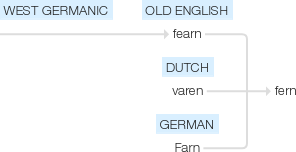Fern
Old English fearn, of West Germanic origin; related to Dutch varen and German Farn .
wiktionary
From Middle English fern, from Old English fearn, from Proto-West Germanic *farn, from Proto-Indo-European *pornóm(“feather, wing; fern, leaf”), from *p(t)erH-(“fern”). Cognate with West Frisian fear, Dutch varen, German Farn, Lithuanian spar̃nas, Avestan 𐬞𐬀𐬭𐬆𐬥𐬀 (parəna), Kamkata-viri por, Sanskrit पर्ण(parṇá).
etymonline
fern (n.)
Old English fearn "fern," from Proto-Germanic *farno- (source also of Old Saxon farn, Middle Dutch vaern, Dutch varen, Old High German farn, German Farn). Watkins and other sources propose an etymology on the notion of "having feathery fronds" from a possible PIE *por-no- "feather, wing" (source also of Sanskrit parnam "feather, leaf;" Lithuanian papartis "fern;" Russian paporot'; Greek pteris "fern"), a proposed suffixed form of the root *per- (2) "to lead, pass over," on the notion of "that which carries a bird in flight."
The plant's ability to appear as if from nothing accounts for the ancient belief that fern seeds conferred invisibility (1590s). Filicology "science or study of ferns" (1848) is from Latin filix "fern."
